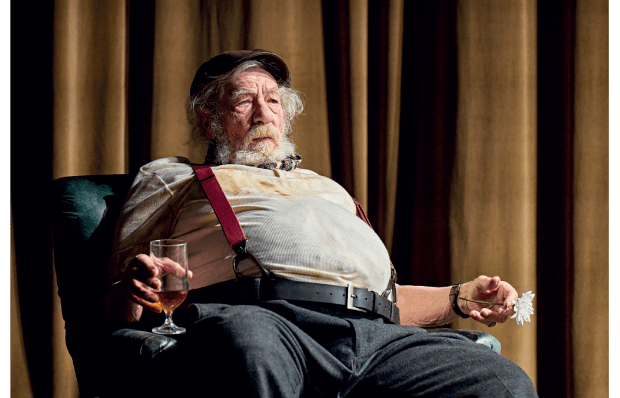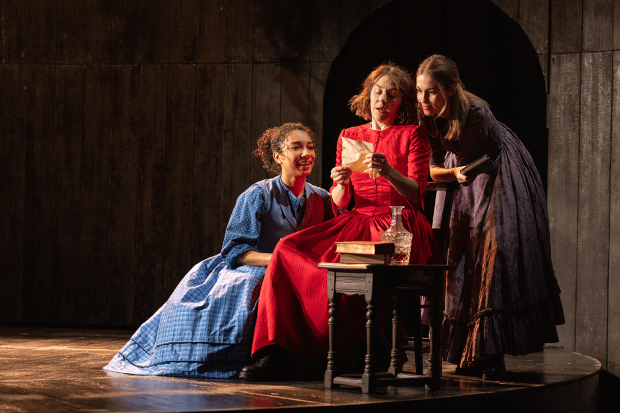Hats off to the Orange Tree Theatre in Richmond. They’ve discovered a new form of racism. Some people say we have enough ethnic division already but in south-west London they’re gagging for more apparently. A new play, Prodigal, examines the prejudice endured by a Ugandan chap whose mother moved to London when he was a child and whose younger siblings are British. Family tensions depressed him. ‘You all made me feel ugly,’ he moans.
The shifty whinger has returned home after his mother’s death in order to cheat his family out of an insurance pay-off. It’s remarkable to see a drama that reinforces a damaging stereotype but the author, Kalungi Ssebandeke, is content to put a bungling African crook on stage. His sister refuses to let him into the flat and hoses him down with rancid abuse. This too is a dreary cliché — the gobby south London airhead whose speech is soured by low–calibre aggression. ‘You fink da world revolves around you, but guess what, it don’t,’ is one of her wittier utterances. This nasty, flimsy melodrama lasts barely half an hour.
Its companion piece, The Kiss, introduces us to an even more rarefied form of prejudice. Zoe Cooper’s play is a monologue spoken by a black lesbian, Lou, who plans to start a course of IVF with her partner, Sophie. The couple have abandoned London to spend lockdown in a northern city. But Lou suspects her new neighbours of greeting her insincerely. ‘Despite the rainbow welcoming committee there’s something a bit too keen,’ she says. Sophie, who happens to be a blonde, doesn’t share her mistrust. ‘Things like this happen less to her,’ comments Lou.
Sophie is working as a teacher while poor old Lou, furloughed from her café job, spends her days moping around the kitchen and watching kids bickering over footballs and skipping ropes in the park. One of her neighbours exercises a pet guinea pig near the flat and the play reaches its climax when Lou gives the rodent a cuddle. She catches a nasty bug during this encounter and suffers a bad reaction. ‘Snogging that guinea pig made me go into anaphylactic shock,’ she says.
Meanwhile, the beating heart of the story is forgotten. The baby, the fertility treatment and the countless dramatic possibilities of a pregnancy are dropped entirely. Late on, we’re casually told that Covid led to the cancellation of non-emergency appointments and the IVF course won’t start for a few months. Righty-oh. Thanks for telling us. But why write the play? One of the first lessons taught to dramatists is to start every scene later rather than sooner. In other words, declutter the preliminaries and launch the story at its most tense, exciting and dramatic moment. How strange that no one at the Orange Tree Theatre knows about this handy tip. It’s like an art school that hasn’t heard of paint.
Many dramatists are looking at lockdown, which has promising themes of loneliness, melancholy and introspection offset by the desire for liberty, companionship and love. It can’t be that hard, can it? A trio of lockdown plays by Stewart Melton is centred on the motif of escape. The first opens on the carpet of a Scottish home where a granny has just expired. Suddenly the granny springs back to life and crawls towards the telephone while studying her bruised wrist. ‘It’s swollen up like a boxing-glove,’ she says colourfully. In her distress she cries out for her grandson, Zak. But will he arrive?
The next play is set in a van driven by a delivery girl who can’t stop talking. ‘I’m doing a bit of voluntary work,’ she natters, ‘to get me out of the house.’ Her busy round is complicated by her attempts to contact someone called Kylie and by her acute boredom. To amuse herself, and the audience too perhaps, she addresses Apple’s talking robot. ‘Hey, Siri. Know any jokes?’ She’s also infuriated by her controllers who have formed a negative impression of her character. ‘They treat me like I’m some dumb yap-dog,’ she says, sounding like a dumb yap-dog.
The final play is set on a beach where a lonely youngster searches for a dog named Cosmo while talking about his sad childhood in an orphanage.
What’s wrong with these plays? Each has a central character with a clear mission. That’s good. But the sense of jeopardy has been botched. Nothing is at stake. Who cares if granny can’t telephone Zak? It doesn’t matter if the jabbering delivery girl fails to hand out her parcels. And it’s unclear what will happen if the lost dog vanishes for ever. Lockdown is an extremely tricky theme to tackle because it looks so easy. And many theatres seem to assume that audiences are desperate for Covid-related drama. Maybe they want the opposite.
Got something to add? Join the discussion and comment below.
Get 10 issues for just $10
Subscribe to The Spectator Australia today for the next 10 magazine issues, plus full online access, for just $10.
You might disagree with half of it, but you’ll enjoy reading all of it. Try your first month for free, then just $2 a week for the remainder of your first year.














Comments
Don't miss out
Join the conversation with other Spectator Australia readers. Subscribe to leave a comment.
SUBSCRIBEAlready a subscriber? Log in